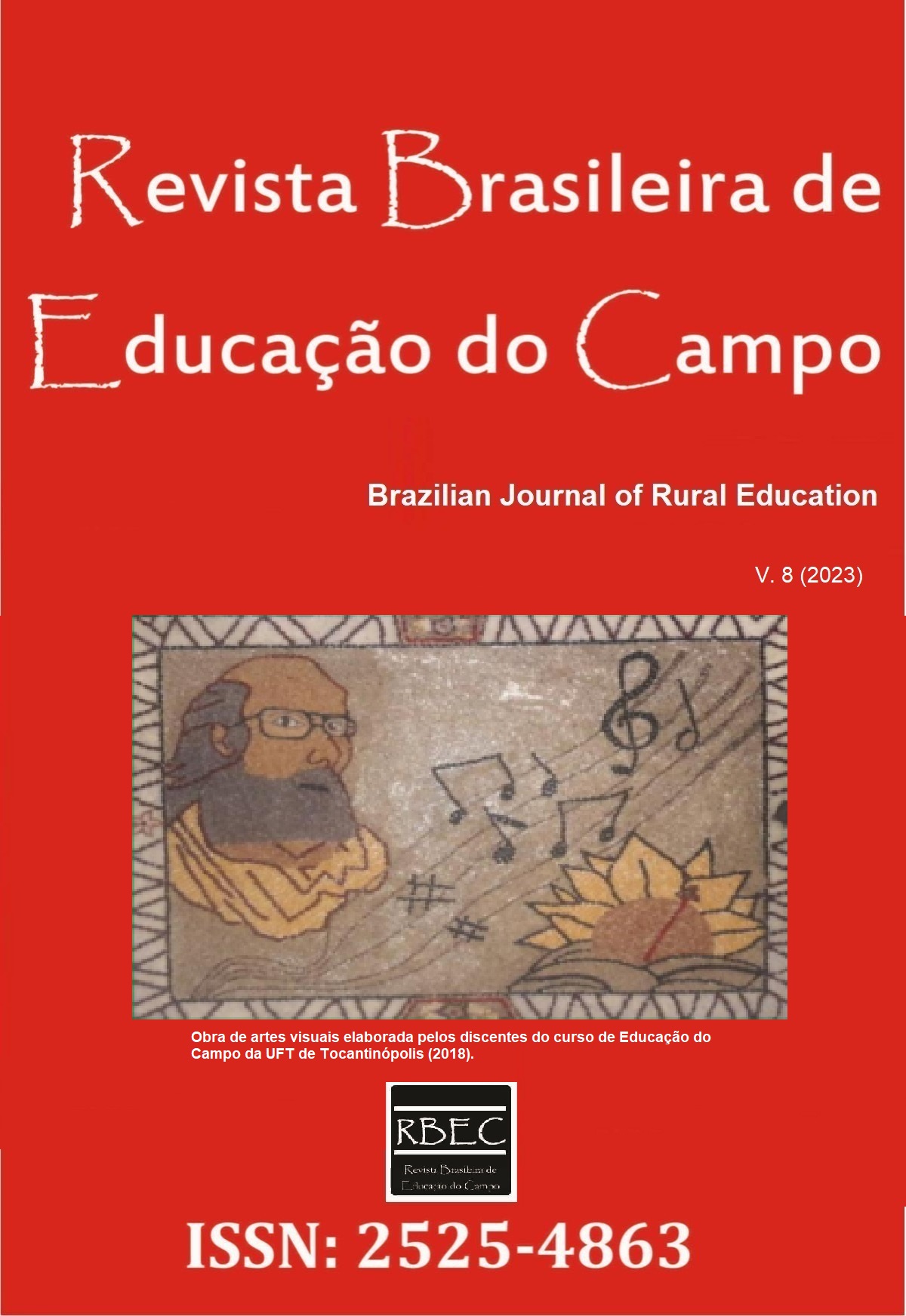The proposal of hybrid teaching from Parecer CNE/CP 14/22 and the precariousness of teacher training
DOI:
https://doi.org/10.20873/uft.rbec.e15370Abstract
ABSTRACT. The object of study of this text is the Parecer 14/22, an assent issued by the National Council of Education that establishes guidelines for the implementation of blended learning in Brazilian Higher Education. The research aimed to verify the notion of hybrid teaching proposed implicitly by the opinion, to make explicit its social, cultural, and ideological connections and predict the impacts of this alignment on pedagogical work. Through a critical document analysis supported by critical discourse analysis procedures, it questions the notion of blended learning built into the document, revealing its links to the flexible accumulation’s educational discourse. The paper points out elements in the textual construction and shows that the flexibility of teaching spaces and times operated by digital information and communication technologies mediation, as proposed in the document, would favor the implementation of a pedagogy of competencies aligned with hegemonic ideological perspectives. It also evidences that the articulation between these factors would lead to the impairment and precariousness of teacher training, impacting the guarantee of the right to education and perpetuating inequality and exclusion of the working class. Thus, the text concludes that there is an urgent need for education workers to lead the debate on the use of contemporary technologies in teaching, considering work as an educational principle and maintaining the centrality of the proposals in the teacher-student pedagogical relationship.
Downloads
References
Ball, S., Maguire, M., & Braun, A. (2012). How Schools Do Policy: Policy enactments in secondary schools. Londres, Reino Unido: Routledge.
Bowe, R., Ball, S. J., & Gold, A. (1992). Reforming education & changing schools: case studies in Policy Sociology. Londres, Reino Unido: Routledge.
Diário Oficial da União, Seção I, nº 67, de 06 de abril de 2023. (2023) Brasília, DF: Imprensa Nacional. Recuperado de https://pesquisa.in.gov.br/
Fairclough, N. (2001). Discurso e mudança social. Brasília/DF: Editora UnB.
Fairclough, N. (2012). Análise crítica do discurso como método em pesquisa social científica. Linha d'água, 25(2), 307-309.
Harvey D. (1992). Condição pós-moderna. São Paulo, SP: Loyola.
Kuenzer, A. Z. (1985). Pedagogia da Fábrica: as relações de produção e a educação do trabalhador. São Paulo, Cortez.
Kuenzer, A. Z. (2007a). Da dualidade assumida à dualidade negada: o discurso da flexibilização justifica a inclusão excludente. Educação & Sociedade, 28(100), 1153–1178. https://doi.org/10.1590/S0101-73302007000300024
Kuenzer, A. Z. (2007b). Reforma da educação profissional ou ajuste ao regime de acumulação flexível?. Trabalho, Educação e Saúde, 5(3), 491–508. https://doi.org/10.1590/S1981-77462007000300009
Kuenzer, A. Z. (2017). Trabalho e escola: a flexibilização do ensino médio no contexto do regime de acumulação flexível. Educação & Sociedade, 38(139), 331-354. https://doi.org/10.1590/ES0101-73302017177723
Kuenzer, A. Z. (2020). Sistema educacional e a formação de trabalhadores: a desqualificação do Ensino Médio Flexível. Ciência & Saúde Coletiva, 25(1), 57-66. https://doi.org/10.1590/1413-81232020251.28982019
Kuenzer, A. Z. (2021). A precarização do trabalho docente: o ajuste normativo encerrando o ciclo. In Magalhães, J., et al. (Orgs.) Trabalho docente sob o fogo cruzado (pp. 235-250). Rio de Janeiro, RJ: UERJ.
Mainardes, J. (2006). Abordagem do ciclo de políticas: uma contribuição para a análise de políticas educacionais. Educação & Sociedade, 27(94), 47–69. https://doi.org/10.1590/S0101-73302006000100003
Mainardes, J. (2017). A pesquisa sobre política educacional no Brasil: análise de aspectos teórico-epistemológicos. Educação em Revista, 1(33), 1-25. https://doi.org/10.1590/0102-4698173480
Mainardes, J. (2018). J. A abordagem do ciclo de políticas: explorando alguns desafios da sua utilização no campo da Política Educacional. Jornal de Políticas Educacionais, 12(16), 1-19.
Parecer CNE/CP nº 14/2022, aprovado em 5 de julho de 2022. (2022). Brasília, DF: Conselho Nacional de Educação/Conselho Pleno. Recuperado de http://portal.mec.gov.br/index.php?option=com_docman&view=download&alias=238781-pcp014-22&category_slug=julho-2022-pdf&Itemid=30192
Santos, E. (2021). O ensino híbrido como “a bola da vez”: Vamos redesenhar nossas salas de aula no pós-pandemia? Revista Docência e Cibercultura, junho de 2021. Recuperado de https://www.e-publicacoes.uerj.br/index.php/re-doc/announcement/view/1289
Saviani, D. (2020). Crise estrutural, conjuntura nacional, coronavirus e educação - o desmonte da educação nacional. Exitus 1(10), 1-25. http://orcid.org/0000-0002-3148-3055
Saviani, D., & Galvão, A. C. (2021). Educação na pandemia: a falácia do “ensino” remoto. Universidade & Sociedade, 67(1), 36–49.
Downloads
Published
How to Cite
Issue
Section
License
Copyright (c) 2023 Thaise Luciane Nardim, Leonardo Pereira da Costa

This work is licensed under a Creative Commons Attribution 4.0 International License.
Proposal for Copyright Notice Creative Commons
1. Policy Proposal to Open Access Journals
Authors who publish with this journal agree to the following terms:
A. Authors retain copyright and grant the journal right of first publication with the work simultaneously licensed under the Creative Commons Attribution License that allows sharing the work with recognition of its initial publication in this journal.
B. Authors are able to take on additional contracts separately, non-exclusive distribution of the version of the paper published in this journal (ex .: publish in institutional repository or as a book), with an acknowledgment of its initial publication in this journal.
C. Authors are permitted and encouraged to post their work online (eg .: in institutional repositories or on their website) at any point before or during the editorial process, as it can lead to productive exchanges, as well as increase the impact and the citation of published work (See the Effect of Open Access).















